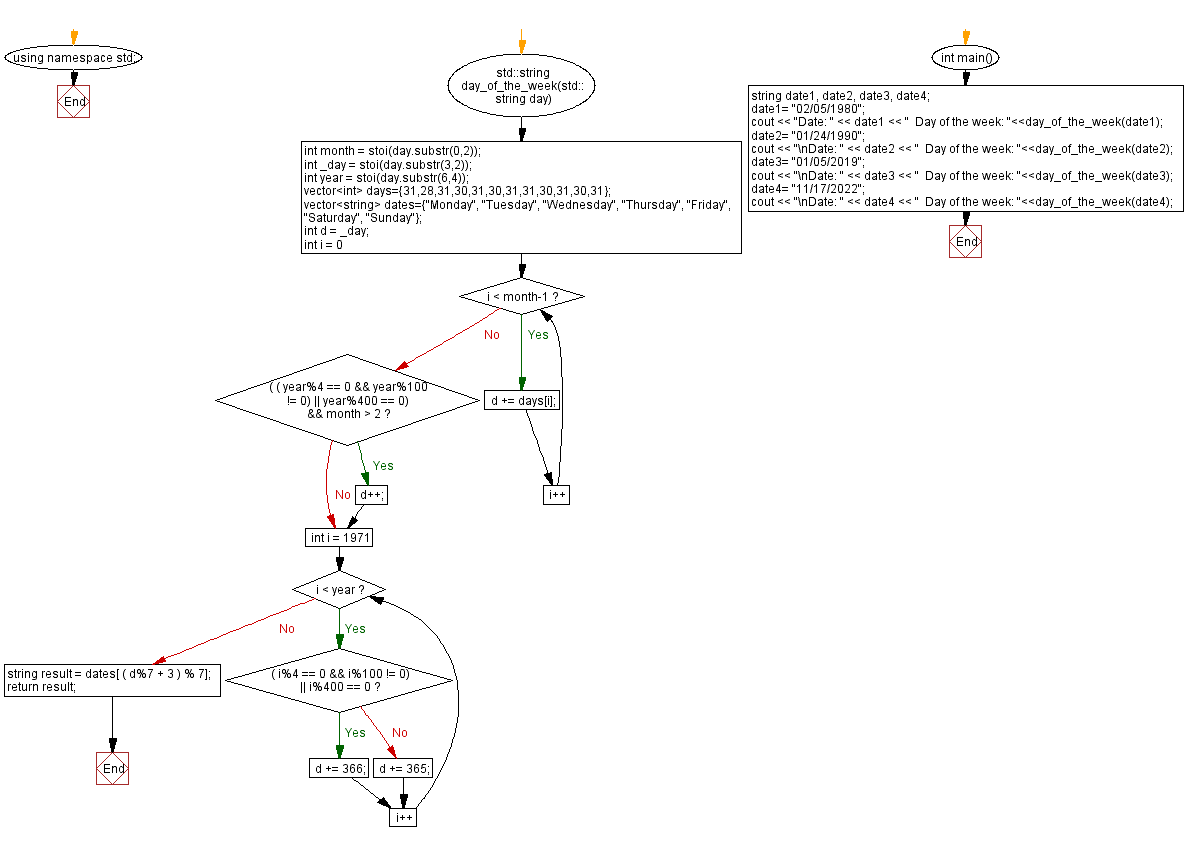C++ Exercises: Get the day of the week from a given date
2. Day of the Week from a Given Date
Write a C++ program to get the day of the week from a given date. Return the day as a string. The format of the day is MM/DD/YYYY.
- YYYY denotes the 4 digit year.
- MM denotes the 2 digit month.
- DD denotes the 2 digit day.
Note: Assume the week starts on Monday.
Sample Solution:
C++ Code:
#include <iostream>
#include <string>
#include <vector> // Including the vector library for using vectors
using namespace std; // Using the standard namespace
// Function to find the day of the week for a given date
std::string day_of_the_week(std::string day) {
int month = stoi(day.substr(0, 2)); // Extracting the month from the date string and converting it to an integer
int _day = stoi(day.substr(3, 2)); // Extracting the day from the date string and converting it to an integer
int year = stoi(day.substr(6, 4)); // Extracting the year from the date string and converting it to an integer
// Vector storing the number of days in each month
vector<int> days = {31, 28, 31, 30, 31, 30, 31, 31, 30, 31, 30, 31};
// Vector storing the names of the days in a week
vector<string> dates = {"Monday", "Tuesday", "Wednesday", "Thursday", "Friday", "Saturday", "Sunday"};
int d = _day; // Initialize the total days with the given day of the month
// Calculate the total number of days considering the months before the given month
for (int i = 0; i < month - 1; i++)
d += days[i];
// Adjust for leap years, adding an extra day for February if the year is a leap year and the month is after February
if (((year % 4 == 0 && year % 100 != 0) || year % 400 == 0) && month > 2)
d++;
// Calculate the total days considering the years before the given year
for (int i = 1971; i < year; i++) {
if ((i % 4 == 0 && i % 100 != 0) || i % 400 == 0)
d += 366; // Leap year
else
d += 365; // Non-leap year
}
// Calculate the day of the week using the obtained total days, adjusting with a fixed offset
string result = dates[(d % 7 + 3) % 7];
return result; // Return the day of the week
}
// Main function
int main() {
string date1, date2, date3, date4; // Declare strings to store different dates
date1 = "02/05/1980"; // Assign a date
cout << "Date: " << date1 << " Day of the week: " << day_of_the_week(date1); // Display the date and its corresponding day of the week
date2 = "01/24/1990"; // Assign a date
cout << "\nDate: " << date2 << " Day of the week: " << day_of_the_week(date2); // Display the date and its corresponding day of the week
date3 = "01/05/2019"; // Assign a date
cout << "\nDate: " << date3 << " Day of the week: " << day_of_the_week(date3); // Display the date and its corresponding day of the week
date4 = "11/17/2022"; // Assign a date
cout << "\nDate: " << date4 << " Day of the week: " << day_of_the_week(date4); // Display the date and its corresponding day of the week
return 0; // Return 0 to indicate successful execution
}
Sample Output:
Date: 02/05/1980 Day of the week: Tuesday Date: 01/24/1990 Day of the week: Wednesday Date: 01/05/2019 Day of the week: Saturday Date: 11/17/2022 Day of the week: Thursday
N.B.: The result may vary for your current system date and time.
Flowchart:

For more Practice: Solve these Related Problems:
- Write a C++ program that reads a date in MM/DD/YYYY format and determines the day of the week using Zeller’s congruence.
- Write a C++ program to calculate the day of the week for a given date and then output the result in full (e.g., "Tuesday") using a switch-case structure.
- Write a C++ program that converts a date from MM/DD/YYYY format to a day-of-week string by using the C++ chrono library.
- Write a C++ program to compute the day of the week from an input date and validate the date input for leap years and correct month-day combinations.
Go to:
PREV : Current Date and Time.
NEXT : Convert a Given Year to a Century.
C++ Code Editor:
Contribute your code and comments through Disqus.
What is the difficulty level of this exercise?
Test your Programming skills with w3resource's quiz.
